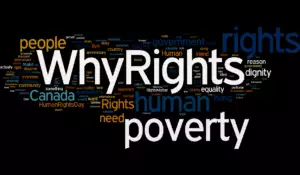Last month, CWP ran a series of blogs and social media activities asking our community #WhyRights matter to them in ending poverty. We took their answers and created a “word cloud” — a visual representation of the ideas that were coming up again and again. Popular reasons included dignity, humanity, and the idea that people are at the heart of poverty-related policy decisions.
With this in mind, CWP’s Legal Education and Outreach Coordinator, Michèle Biss, wrote an article published on Rabble.ca with her own reasons for why rights matter. Check it out below:
Why Rights? Because imagine the Canada we could become
It’s a time for change here in Ottawa — and it’s happening faster than anyone expected.
 From policy changes like the long overdue inquiry into missing and murdered Indigenous women, to the public release of ministerial mandate letters, the political wind seems to have shifted course.
From policy changes like the long overdue inquiry into missing and murdered Indigenous women, to the public release of ministerial mandate letters, the political wind seems to have shifted course.
With this welcome change, it seems that a prime opportunity has arisen to protect the human rights of so many in Canada who have suffered for far too long — those who are living in poverty. Over the past few months, Canada has begun to step up and demonstrate that leading with compassion and respect is the best way forward and the world has taken notice. Our country has a real chance to act as a guidepost for the way we support the most marginalized not only here in Canada but also in the global community.
Last week, communities across the world celebrated the upcoming 50th anniversary of the International Covenant on Economic, Social and Cultural Rights — an international treaty that protects basic needs for social well-being such as the right to food, water, housing and education. This Covenant is sometimes thought of as the less popular sibling of the International Covenant on Civil and Political Rights. Canada has signed both covenants but it seems that far too often the government and people here at home are more willing to rally around civil and political rights violations. Bill C-51, for example, drew waves of protest across the country. Compare that to how Canadians responded to the squalid conditions faced by 4.9 million people living in poverty.
But rights are so important to the way that we understand poverty in Canada. Rights put people at the centre of policy decisions that affect them — they bring dignity and humanity back to the conversation.
There was a time in our history when we were more willing to understand that we have a legal human rights obligation to address poverty. That when, in the cold winter months, people are literally dying because of our inability to act, we are failing in our responsibility to uphold the rights of those among us who live in poverty. Embracing human rights could lead to the end poverty and homelessness in Canada — a feat no government has yet to achieve.
This past December 10, on Human Rights Day, we wanted to explore whether others saw the value in using human rights to address poverty. So, we asked our colleagues, supporters and community: why rights? Here are some of the reasons that kept coming up:
Human rights are the best tool to empower those in poverty. Respect, dignity, equality — those are the words most often used to describe human rights. Forcing us to step into the shoes of others, human rights can transform the way we view ourselves and our role in the world.
Human rights recognize our intersectional identities. A human rights approach to poverty means that we must acknowledge the experiences of those who are marginalized. In Canada, one in two First Nations children are in poverty — there’s a larger systemic issue at hand when particular individuals and communities experience poverty in such significant numbers.
The history of human rights should inform our actions. It’s not a coincidence that the Universal Declaration of Human Rights came from the aftermath of the Second World War. As a global community, we saw the atrocities that people can commit, and decided that humanity could do better.
Overwhelmingly, those who answered “why rights?” acknowledged the humanity that we embrace when we use human rights. We’re all guilty of sometimes losing sight that while we talk about anti-poverty policies, we are fundamentally addressing the suffering of real people — our neighbours, family, friends, and colleagues — those with whom we share a community. Human rights requires us to recognize that we are all human, that we have a responsibility to each other.
As Canada Without Poverty Board Member, Kate Mechan, recently stated “[a]mazing things happen when we reframe human rights as intrinsic to our being”.
There is so much work to be done to move towards a Canada that we can be proud of — one that commits to protecting the dignity of those who most need it — a country that makes sure these promises will stand the test of time. That’s why it’s so fundamentally important that this government’s actions on poverty, for example the creation of Canada’s Poverty Reduction Strategy, reflect an understanding of our human rights obligations.
Here’s my reason why rights — because change happens quickly, but no matter what changes the wind brings, we are part of a human community — we can no longer ignore those among us who are suffering.

